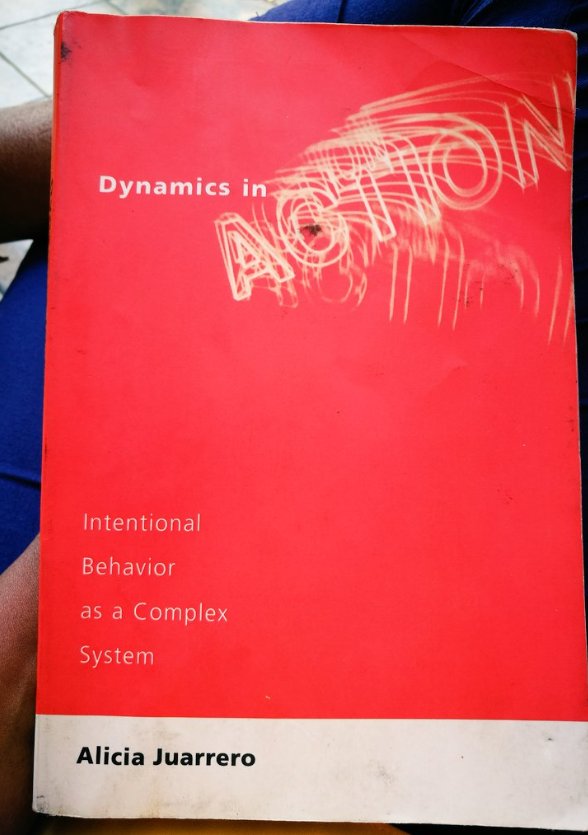Understanding all causes as collusion-like, & the explanatory ideal as deduction from deterministic laws, are 2 ex of a trend that has characterized the history of philo for over 2,000 yrs: the progressive elimination of time & context from metaphysics & epistemology. #Juarrero
Since time & context play a central role in all living things,including human beings & their behaviour,action theory is thus an excllnt prism that refracts & separates two key problems in the history of Western Philo(cause & explanation)lays bare role time & context play in each.
Behaviourist analyses have tried to reduce the flexibility and appropriateness characteristic of human action to stimulus-response patterns. #Juarrero
What went largely unrecognized until recently was the fact that the classical thermodynamics of the 19th century treats all systems as if they are closed, isolated & near equilibrium - which living things are not. #Juarrero
Over the last few decades a new branch of thermodynamics has been developed, variously called the theory of complex adaptive systems, complexity theory, & similar names, that deals w systems far from equilibrium & open in the sense that they exchange matter & energy w their envt.
Interactions among certain dynamical processes can create a systems-level organization with new properties that are not the simple sum of the components that constitute the higher level. #Juarrero
The causal mechanism at work between levels of hierarchical organizations can be best understood as the operations of constraints. #Juarrero
When organized into a complex, integral whole, parts become correlated as a function of context-dependent constraints imposed on them by the newly organized system in which they are now embedded. #Juarrero
The more complex a system, the more states & properties it can manifest: novel charctrtcs & laws emerge w the organization of the higher level. Ex, when amino acids self-organize into a protein, the protein can carry out enzymatic functns that the amino acids on their own cannot.
Constraints work by modifying either a system’s phase space or the probability distribution of events and movements within that space. #Juarrero
There is ample evidence that the human brain is a self-organized, complex adaptive system that encodes stimuli with context-sensitive constraints. #Juarrero
Far from representing messy, noisy complications that can be safely ignored, time and context are as central to the identity and behaviour of dynamic processes as they are to human beings. #Juarrero
Unlike the processes described by classical thermodynamics, which in their relentless march toward equilibrium forget their past, complex adaptive systems are essentially historical. #Juarrero
If human beings and their behaviour are complex adaptive phenomena, the precise pathway that their actions will take is simply unpredictable. #Juarrero
Historical, interpretive stories might not allow us to predict future behaviour, but they do allow us to understand why it is unpredictable. #Juarrero 
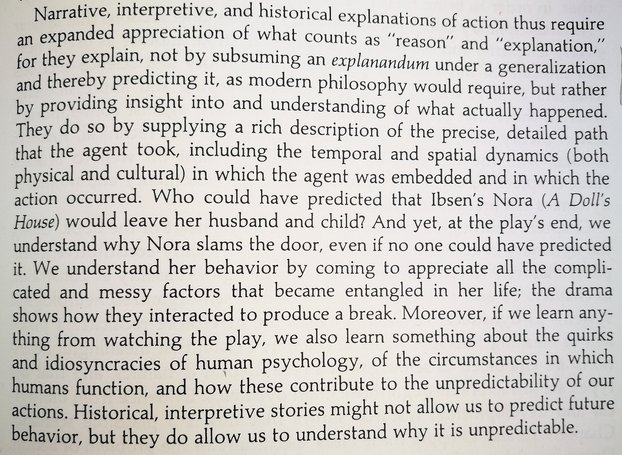
Even after the advent of the theories of evolution and thermodynamics, modern science continued to restrict itself to closed linear systems abstracted from their historical and spatial context. #Juarrero
Only with the recent development of complexity theory have openness, nonlinearity, time, and context come to the forefront. #Juarrero
End of Intro chapter #Juarrero
How the Modern Understanding of Cause Came to Be
“... philosophers are unable to conceptualize and explain either voluntary self-motion or an agent's purposive actions. As is often the case in philosophy, it all goes back to Aristotle.” #Juarrero
“... philosophers are unable to conceptualize and explain either voluntary self-motion or an agent's purposive actions. As is often the case in philosophy, it all goes back to Aristotle.” #Juarrero
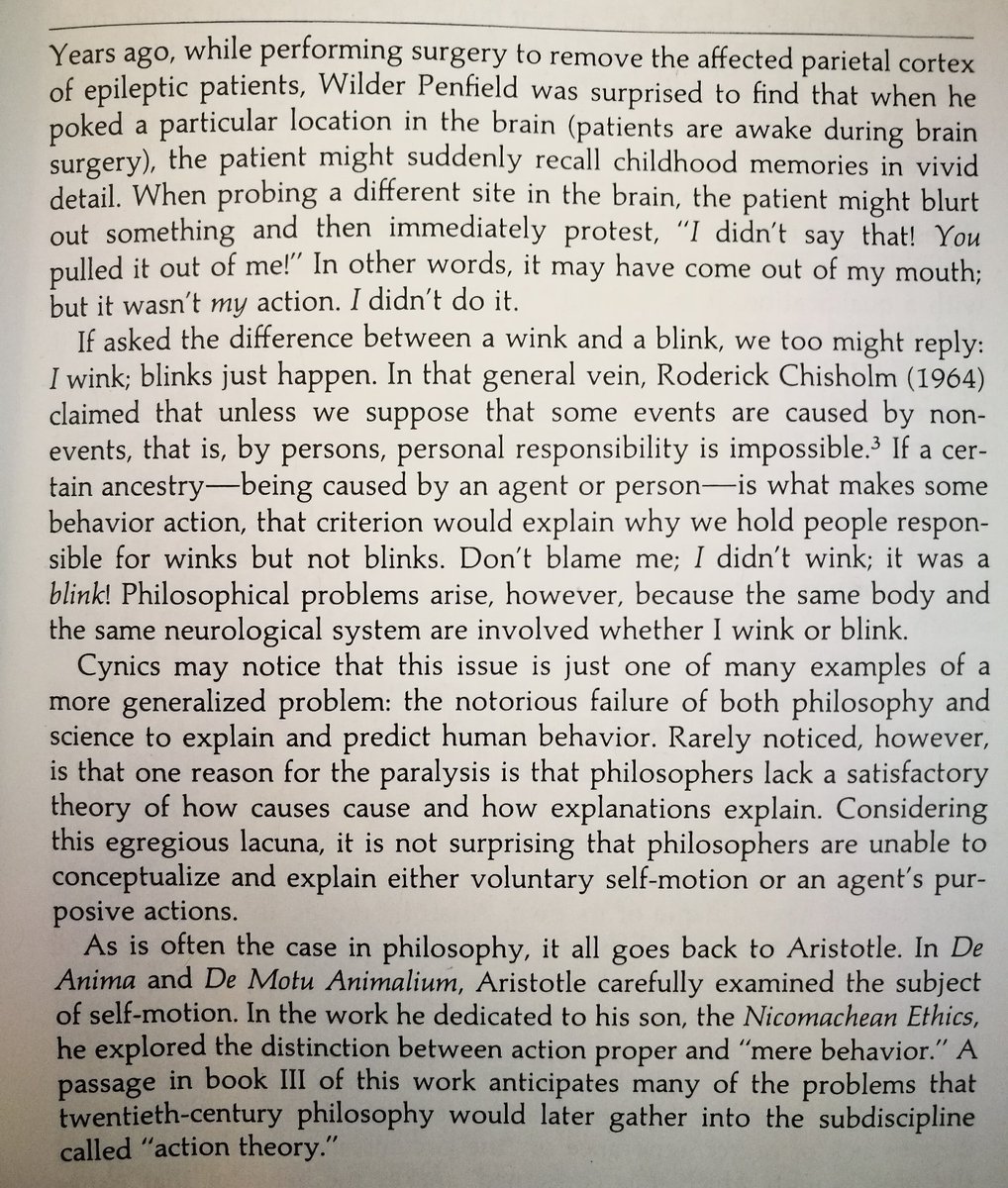
In a universe where only point masses and forces are considered real, qualities that are a function of the relation between atoms, or between organisms and the world, were dismissed as subjective. #Juarrero
By the end of the 17th century, all relational properties, such as temperature and colour, that did not fit into this scheme were relegated to the inferior status of “secondary” qualities. #Juarrero
Galileo's ability to set aside the interference of friction from the equations governing the motion of bodies also suggested that context contributes nothing to reality. #Juarrero
Once atomism became the ruling conceptual framework, context environment were left without a role to play in either science or philosophy. Indexicals such as here & there, this & that, now & then, lost their claim on reality as situatedness and point of view became unimportant.
Newtonian atomism reduced the universe to the relations between single material points whose movements from one position to another are time-reversible. #Juarrero
With this principle of time-reversibility, Newton’s heirs dealt the final blow to Aristotle’s concept of final cause by dismissing as illusory the apparent unidirectionality displayed both in the devlmnt of organic forms & by the aimed-for goal-directedness of intentional behvr.
True self-cause would involve localized parts interacting so as to produce wholes that in turn, as distributed wholes, could influence their components: interlevel causality between parts and wholes. ~> #Juarrero
<~ But by following Aristotle in rejecting this possibility, philosophy closed off any avenue for explaining action in that fashion. #Juarrero
Whether in dualist or materialist guise, and suitably identified as an intention, volition, want-and-belief complex, and the like, cause of action, following Aristotle, have been assumed to be events entirely inside the agent but other than the behaviour itself. #Juarrero
A worldview with a strobelike understanding of time (as well as a gunshot view of cause) has no way of determining when “now” ends and “then” begins. #Juarrero
A theory claiming that action is behaviour caused in a particular manner requires a concept of cause that not only triggers but also structures and sustains behaviour in an ongoing fashion. But none is forthcoming in contemporary philosophy. #Juarrero
Action theory uncritically adopted the standard billiard ball model of Newtonian science: one particle bumps into a second, which it activates even as it disengages. #Juarrero
There is a much closer connection between whatever originates action and the action itself than between billiard balls. #Juarrero
That closeness serves as the ground for appropriateness of certain behaviour given an agent’s reasons or intentions. The closeness is reflected in the description of an intention as the intention-to-do-x. #Juarrero
But advocates of traditional causal relations balked at all this talk because it appears to violate the required separation between cause and effect, a dogma that remains unquestioned, as does the dogma that all cause is efficient cause. #Juarrero
End of chapter 2 #Juarrero
Aristotelian Science and Practical Wisdom #Juarrero
The perpetual tension between #UniversalVsParticular
The perpetual tension between #UniversalVsParticular
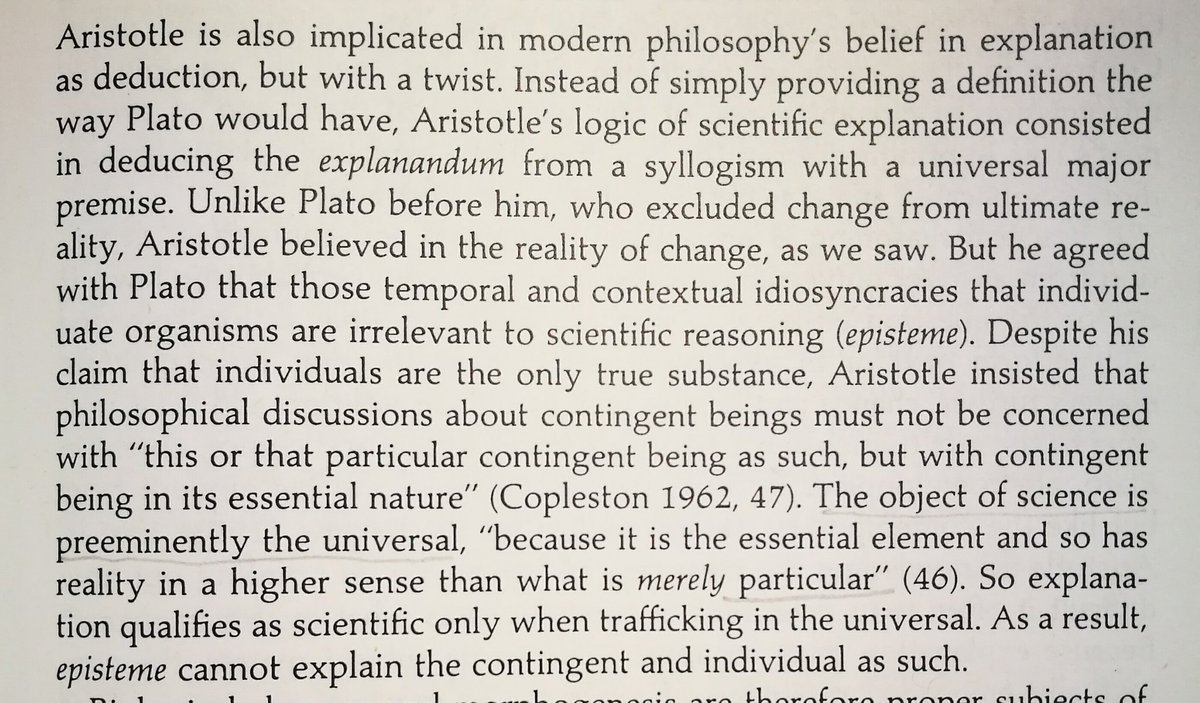
If practical reasoning is unavoidably temporal and contextual, deduction from abstract universals, or even inference from probabilistic laws, is out of the question either as a way of predicting what action someone will perform next or of explaining what he or she did. #Juarrero
Renaissance thinkers like Montaigne acknowledged that universal, foundational principles cannot be applied to such practical matters as law, medicine and ethics; the role that context and history play in those areas prevents it. #Juarrero
How explaining an event came to be identified with predicting it and with that the separation of the hard and soft sciences. #Juarrero 

To claim that certain social, empirically determinable conditions, followed by a certain behavior, constitute action is plausible only on the condition that the agent is aware of the meaningful import of the situation [point made via a fascinating little story]. #Juarrero 
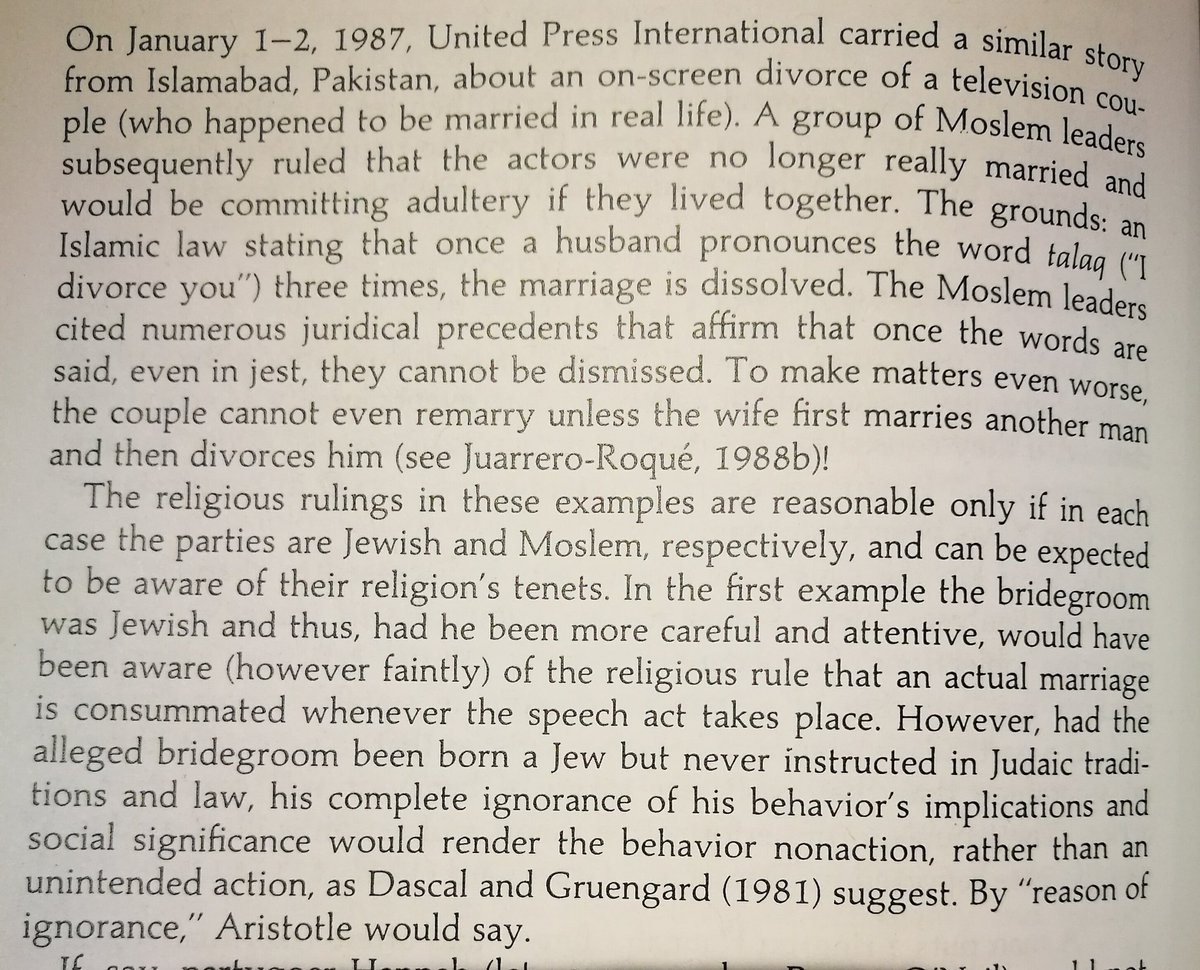
Action is lawful, and the laws to which it conforms refer to social patterns, standards, and conventions. Our explanations and predictions presuppose this. #Juarrero
A rule-following model of explanation is therefore unlike a mechanical model. Behavior can be explained as action only if set in the context of socially delineated means-ends conventions. #Juarrero
The problem of action is not only a problem of explanation; it is primarily an ontological matter. It is not a matter just of how or why we come to see behavior as action; it is a matter of what makes some behavior action. #Juarrero
Goaldirectedness is not a generalized tending toward an end state. #Juarrero 
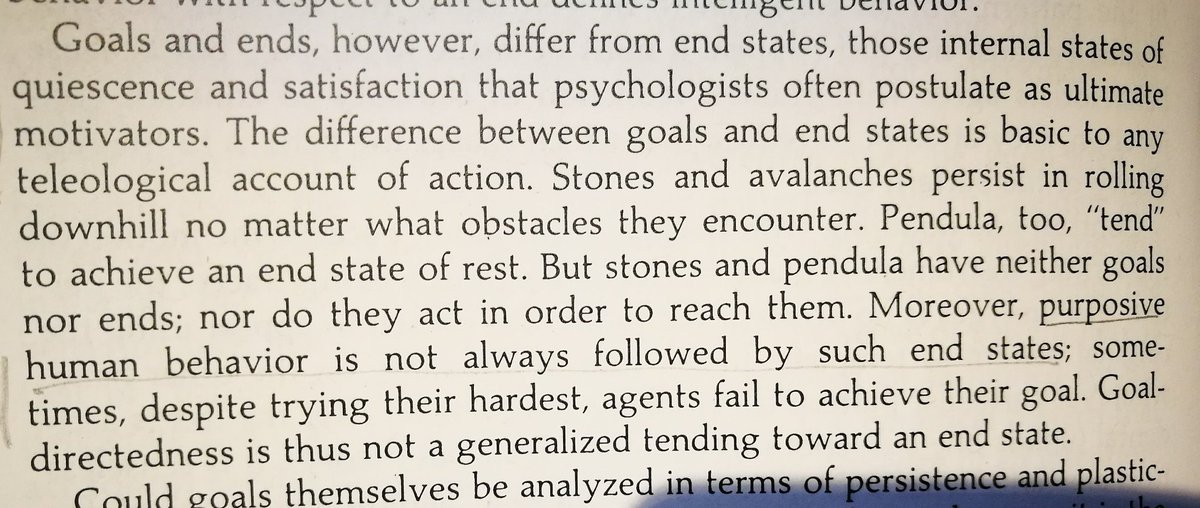
There is no tidy, linear pairing of causes and effects in human action as there is in the realm of classical mechanics. Despite conditions a, h, and c, people inevitably surprise us by doing the unexpected - not the expected x, y, or z. #Juarrero
It might be argued, however, that to circumvent this objection, the behaviorist conditional must be specified in more detail: ~>
"Whenever circumstances a, h, and c exist, behavior x, y, and z will be performed, unless 1, 2, 3, . . ., n," with every "unless" qualification that counterfactually affects the entailment fully spelled out. #Juarrero
However, since human beings are complex dynamical systems, this is a hopeless dream. #Juarrero
Their exquisite sensitivity to initial conditions would require that these be specified with literally infinite precision. Each "whenever " & "unless" clause would require infinitely precise qualification, the result being a "universal law" that in fact refers to only one case.
Behaviorist theories attempted, unsuccessfully, to reduce the appropriateness and fittingness characteristic of action to various stimulus-response patterns, including plasticity around a goal object. #Juarrero
Act-tokens must be explained by referring to the agent's purposes and ends, and, to the appropriateness of the behavior given those purposes and ends. ~> #Juarrero
This directed flow of events contrasts with the in-principle reversibility of Hume and Newton's accounts of causality, according to which it is possible for any sequence of events to go backward as well as forward. #Juarrero ~>
In mechanics, event a could be followed by event b as well as vice versa. According to Hume, since one experiences no necessitating, directed force between two events, their order, too, is also in principle reversible. #Juarrero ~>
In the case of action, on the other hand, the very concepts of intention, disposition, agents, reasons, and the like have a built-in one-wayness: they imply that these concepts issue in behavior, not vice versa. Not all one way behavior is purposive, to be sure. #Juarrero
Pendula tend toward a resting state, and avalanches persist in reaching the valley; but although both phenomena exhibit plasticity and persistence toward an end, neither pendula nor avalanches have goals. #Juarrero
Although philosophers today would look askance on an appeal to final causes, any acceptable theory of action must still satisfactorily account for this apparently directed flow of information or meaning from cognitive source to behavioral terminus. #Juarrero
We do not appeal to mental states to explain the incredible complexity of behavioral patterns that one has (antecedently) recognized. #Juarrero ~>
On the contrary, we come to believe that there is a "complexity" to be resolved in the behavioral manifestations because we already suspect that there is (or might be) a difference in the agent's motivation, that is, in the agent's mental life. #Juarrero
Behaviorist accounts [of action] attempted to reduce intelligent action to persistent yet plastic behavioral patterns. In analyzing away the concept of goalhood, behaviorists tried to bypass such ghostly and private notions as having a goal, awareness, and intention. #Juarrero
One positive contribution of behaviorism that is rarely remarked on: behaviorism resuscitated the role that the environment plays in action. #Juarrero
Contextual embeddedness had been an important component in Aristotle's understanding of action, but was discarded by modern philosophy's emphasis on primary qualities as the only reality. #Juarrero
By suggesting that behavior is somehow connected to and dependent on events in the environment, behaviorism clearly emphasized the role that context plays in the life of organisms. #Juarrero
< But bringing context back into the picture as behaviorists attempted requires a type of cause much different from the collision - like trigger of mechanics. #Juarrero
Lacking such an understanding of cause, and reinforced in their Aristotelian conviction that causes are external to their effects, logical behaviorists never quite embedded the agent in the environment to create an integral organism - context system. #Juarrero
They just plunked the organism in the environment and assumed that when the appropriate stimulus occurred, boom! the organism would automatically respond. #Juarrero
With the Humean view of explanation as deduction firmly entrenched, "if not predictable not explained " remains the reigning standard to which all disciplines aspire. #Juarrero
Several decades after the heyday of behaviorism but with no strict covering law (not even a probabilistic one) capturing regularities between empirical circumstances & human behavior on the horizon, the conclusion appeared inescapable: "Human behavior is inexplicable." #Juarrero
But recent research in nonlinear dynamical systems suggests, on the contrary, that if organisms are more like tornadoes or even "chaotic" systems than like glass or planets, behaviorism's ideal was doomed from the start. #Juarrero
< The reason is that in open systems that exchange matter and energy with their environment, feedback embeds them in that environment in such a way that they are simultaneously context-dependent and initiators of behavior. As a result, their trajectories are unique. #Juarrero
The end of ch 5 - a very dense chapter and these tweets don’t do it any justice but there you go… #Juarrero
Basic assumptions on which the modern scientific worldview was based came under attack over time. In the nineteenth century alone, two challenges appeared to that conceptual framework: thermodynamics and evolutionary theory. #Juarrero
Thermodynamic systems can use energy only when "the arrangement of energy is to some extent 'orderly': higher temperature here, lower temperature there, and a clearly marked contrast between the two". #Juarrero
The first law of thermodynamics states that the total amount of energy in the universe is conserved. The second states that, over time, the disorderly arrangement of energy, entropy, inexorably increases, and the orderly, usable arrangement of energy decreases. #Juarrero
Unlike the phenomena of Newtonian mechanics, the equations for which are time-reversible, thermodynamic processes thus exhibit an irreversible tendency toward increasing disorder, a death march that will ultimately terminate in a state characterized by a complete lack of >
< energy potential, that is, by the uniformization of the universe's arrangement of energy. This equilibrium state constitutes the heat death of the universe. #Juarrero
The inexorable increase of unusable energy (entropy) postulated by classical thermodynamics provided a criterion for differentiating past from present and future. #Juarrero
Measuring the change in the amount of entropy tells you the sequence in which events happen: the state with less entropy comes first, the one with more entropy next, the one with total entropy last. #Juarrero
In contrast to Newtons time-neutral equations, thermodynamics therefore appeared to return irreversibility and temporal direction to science, vindicating the intuition that whereas you can go from an egg to an omelette, the reverse is impossible. #Juarrero
In the end, thermodynamics teaches, you can’t put Humpty back together again. #Juarrero
However, as Boltzmann (1877) argued that the one-wayness pertains only to macroscopic, statistically averaged-out systems; at the atomic level events remain neatly, time reversibly Newtonian. #Juarrero
The arrow of time thus applies only to the law of large numbers; at the microscopic atomic level, ultimate reality remains properly timeless. #Juarrero
Thermodynamics may have brought time back into the scientific picture, but history still remained absent from the structures of classical, near-equilibrium thermodynamics: their progression toward equilibrium remains ahistorical in the sense that they forget where they came from.
The specific location and circumstances from which a system started out, and the particular path it has traversed to date, are irrelevant; whatever its origin, the system will eventually reach equilibrium. #Juarrero
Thermodynamic systems near equilibrium are therefore insensitive to initial conditions. Their past does not affect either their present or their future. #Juarrero
Both classical mechanics and thermodynamics, however, agreed on the deterministic and "machinelike" quality of the universe; they disagreed only on whether motions are reversible. #Juarrero
19th-c thermodynamics deals only with systems as if they were closed and isolated from their environmental context ignoring the relational, secondary qualities - properties that appear in virtue of an object's interactions with its surroundings and its past. #Juarrero 
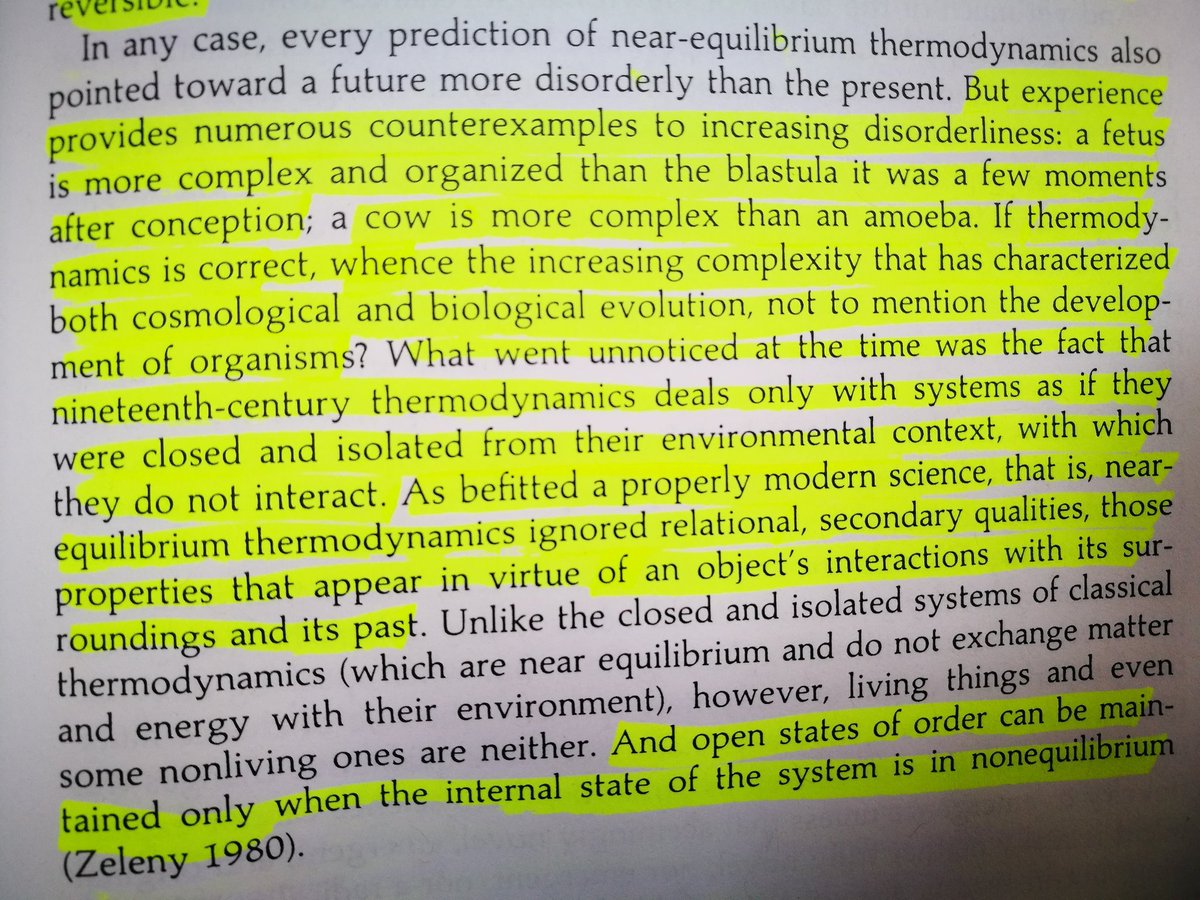
#Juarrero on evolution: In a blow to Plato, not to mention religious fundamentalism, Darwin undermined the idea that essences exist that universally and eternally mark off this kind of organism from that. Natural kinds are not eternal; species evolve over time.
Darwin's writings returned context to science for the first time in centuries. The specific ecological niche in which an organism is embedded matters greatly, since it determines which organisms live and get to reproduce and which do not. #Juarrero
Because organisms are more or less fit relative to the particular environmental niche in which they are located, fitness is therefore a relational property, not a primary one like mass. #Juarrero
And yet much of the flavor of Newtonian mechanics continued to permeate the theory of evolution (Depew and Weber 1995), particularly in the way Darwin understood explanation. #Juarrero
The radical change from Aristotle to Darwin was the recognition that, through the environment's selective pressure on reproductive success, unpredictable, truly novel phenotypic features could be passed on to future generation. #Juarrero
Open systems far from equilibrium show a reduction in local or internal entropy; they are able, in other words, to create form and order. #Juarrero
General systems theory was first articulated by organismic biologist Ludwig von Bertalanffy (1981) as a counterpoint to classical science's mechanistic understanding of human beings and nature. #Juarrero
[General systems theory]'s fundamental claim is that when living things are embedded in a orderly context, properties emerge that are not present when the things exist as isolated individuals. #Juarrero
Picking up where Darwin left off, systems theory continued the revival of relational or secondary properties by reminding us that context matters. But it does so very differently than behaviorism. #Juarrero
The environment of interest to the systems theorist is not the total environment but the environment that affects and is affected by the thing in question. At any given moment a particular system is characterized by the structure (both internal and external) that individuates it.
Together, the internal and external structure constitute the system's total structure. A system with no external structure - no environment with which it interacts - is a closed and isolated system. Only the entire universe is closed and isolated. #Juarrero
A system's functional efficiency is often related to its integration. The system is called stable if it returns to or fluctuates minimally around a constant value. #Juarrero
For the most part, the more flexible the coupling between the subsystems, the greater the overall system's stability. #Juarrero
Resilience is "the ability of the system to absorb changes ... and still persist" (Holling 1976). A system can be quite resilient yet unstable if it persists as that (kind of) system despite wide fluctuations. #Juarrero
Resilient systems are able to modify their specific structure so as to ensure the adaptability and survival of their overall organization. Insects and viruses are remarkably resilient: they can mutate dramatically and so persist. #Juarrero
Complex systems are usually more resilient than simple ones, with complex open systems that interact with their environment exhibiting the highest degree of resilience. #Juarrero
As anyone who has tried to rid his house of cockroaches can confirm, evolution generally favors resilience, not stability. #Juarrero
Allopoiesis versus Autopoiesis:
Because their organization is given "from the outside," machines are allopoietic. Living organisms, on the other hand, self-assemble, and as such are examples of autopoietic (self-organizing) systems. #Juarrero
Because their organization is given "from the outside," machines are allopoietic. Living organisms, on the other hand, self-assemble, and as such are examples of autopoietic (self-organizing) systems. #Juarrero
Thermostats do not self-organize. #Juarrero 
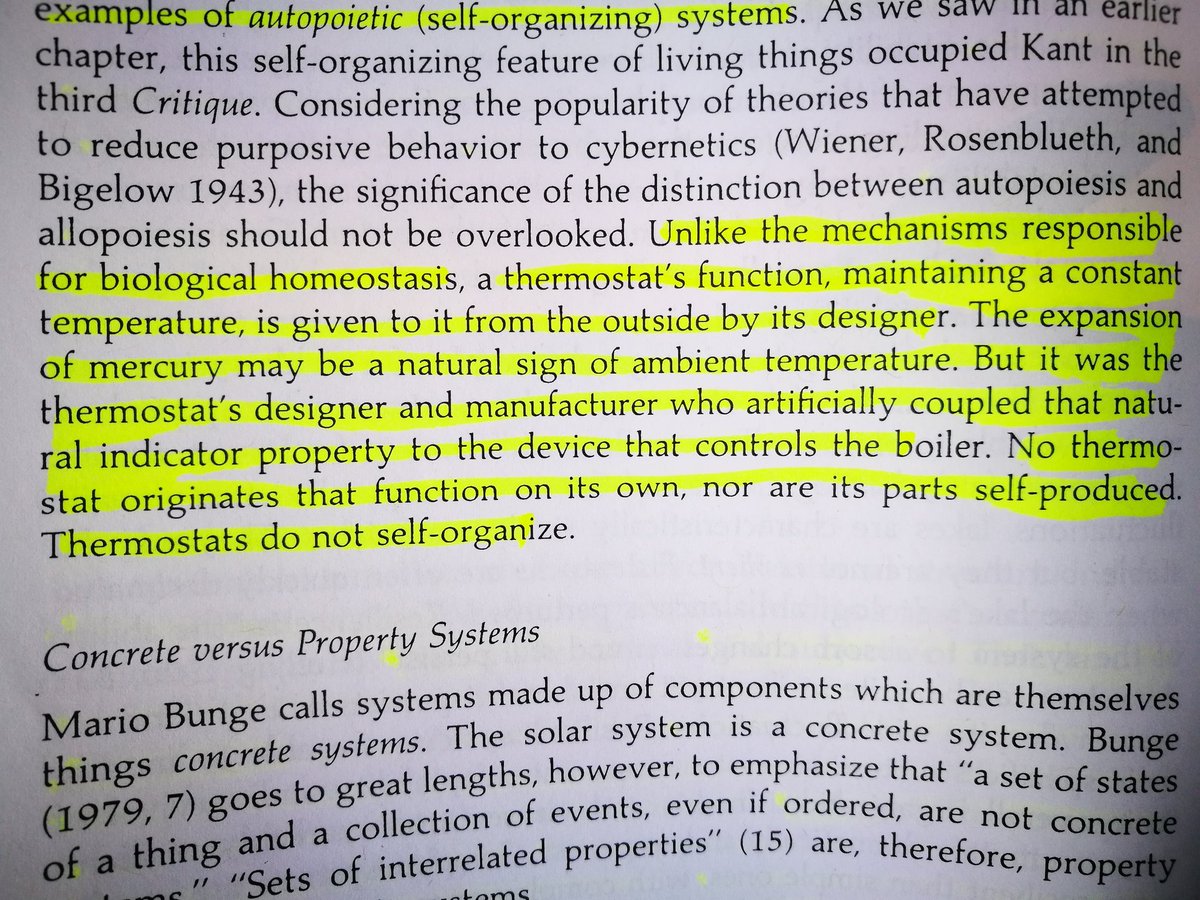
No closed system near equilibrium ever becomes more complex or ordered. #Juarrero
But even crystallization is an order-producing process. And living things, unlike crystals, are not "frozen accidents." They are dynamical, adaptive, and evolving beings that interact with their environment through exchanges of matter and energy. #Juarrero
As we climb the developmental & phylogenetic ladders, organisms grow & species become increasingly complex, one mark of which is their ability to access a greater variety of states and behaviors. People can blink but amoebas can't; grown-ups can wink but newborns can't. #Juarrero
The human sciences have often been tempted to model their subject matter after the (idealized) linear, closed systems near equilibrium that the hard sciences studied and that, for those very reasons, were tractable and in consequence produced spectacular results. #Juarrero
I take it as self-evident today that human beings are neither linear, closed, nor near equilibrium, nor likely to be understood by models with these assumptions. #Juarrero
People are neither isolated from their surroundings nor simply dropped into an environment that pushes them hither and yon. On the contrary, they are embedded in their environment, which they in turn influence. #Juarrero
End of chapter 7. #Juarrero Thanks for your patient.
• • •
Missing some Tweet in this thread? You can try to
force a refresh

